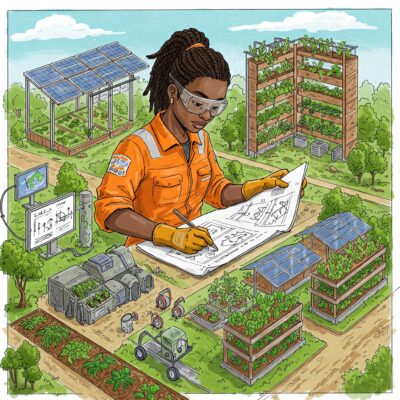Environmental engineers develop and implement solutions to environmental challenges, such as pollution control, waste management, and sustainable resource use. They combine engineering principles with environmental science to protect ecosystems and human health.
What is a typical day in Environmental Engineering?
– Designing systems for water treatment, waste disposal, or air pollution control
– Conducting environmental impact assessments for new projects
– Analyzing data and preparing technical reports
– Collaborating with government agencies, organizations, and communities to implement solutions
What else might they be expected to do?
– Monitor environmental regulations and ensure compliance
– Develop sustainability plans for industries or municipalities
– Educate stakeholders on environmentally friendly practices
What type of training is needed for this career path?
– A Bachelor’s degree in Environmental Engineering, Civil Engineering, or Chemical Engineering is typically required.
– A Master’s degree or professional certification (e.g., LEED) can enhance career prospects.
– Training in Geographic Information Systems (GIS) and environmental modeling tools is beneficial.
What kind of personality is needed to excel in this career path?
– Analytical and solution-oriented individuals with a passion for the environment excel in this field.
– Big 5 traits: Openness and Conscientiousness are crucial.
– Myers-Briggs types: INFJ or ENTP often align well with this career.
What kind of interests do people in this career path have?
– Strong interest in sustainability and environmental protection (Realistic and Investigative traits).
– Desire to solve problems that affect ecosystems and public health.
– Interests & Aptitude: Investigative (I), Realistic (R), and Social (S)
Are there any innate skills or aptitudes required?
– Strong problem-solving and critical-thinking skills
– Technical aptitude in design and modeling software
– Communication skills for working with diverse stakeholders
What challenges can I expect to face if I pursue this career path?
– Navigating regulatory and legal complexities
– Balancing economic and environmental priorities in project designs
– Managing projects under budgetary and time constraints
What are the job prospects for this path in Kenya and Africa? What about International prospects for a Kenyan citizen?
– Kenya and Africa: High demand in sectors like water management, renewable energy, and urban planning. Opportunities are increasing as sustainability becomes a priority.
– International: Environmental engineers are in demand globally, especially in countries focusing on green energy and climate adaptation projects.
What should I focus on if I choose to pursue this career?
– Gain expertise in environmental laws and policies.
– Develop skills in project management and sustainable engineering practices.
– Build experience through internships or volunteer work in environmental organizations.
Which other careers or job roles can I progress to?
– Sustainability Consultant
– Urban Planner
– Environmental Scientist
– Renewable Energy Specialist

